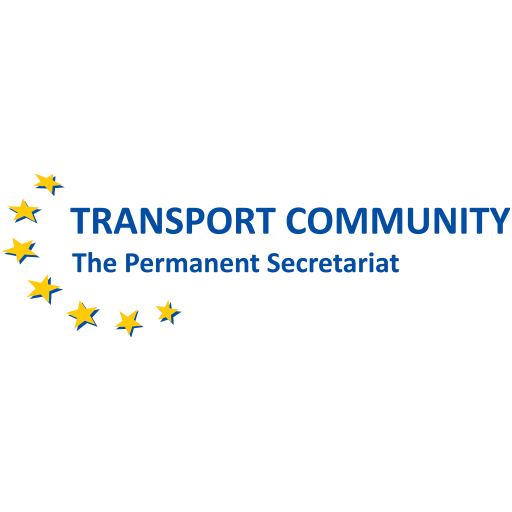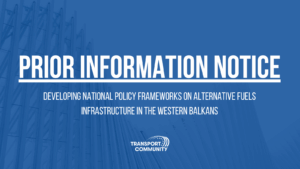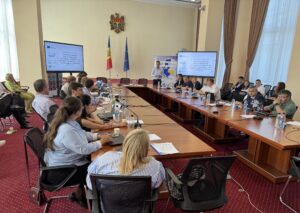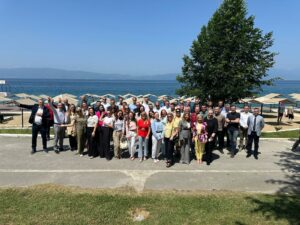Dear Reader,
Three years ago – on 12 July 2017, the Transport Community Treaty (TCT), after almost ten years of difficult negotiations, was finally signed in Trieste. It was however worth waiting for as this Treaty opened a new chapter in the relations between the EU and Western Balkans. It is important to remind the date but also the aim of the Treaty: the Union and the Western Balkans parties agreed to share a common future as regards transport policy.
The signing of the Treaty was a small step towards the accession but it represented a giant leap for the future integration of our respective transport markets.
The signing was only the first step and again a lot of additional energy will be needed to fully implement the Treaty. This task will represent a shared responsibility between the Permanent Secretariat and all the parties belonging to the Treaty.
As far as the Permanent Secretariat is concerned, if some fine tuning remains to do, I am very proud of all what has already been achieved. This was possible thanks to the contribution of the Regional Steering Committee, thanks to the remarkable work carried out – in difficult conditions – by the TCT staff and thanks to the essential support offered by highly committed European Commission and (EU) Council’s colleagues.
The work to implement the secretariat started just after Trieste. The negotiations for the seat and the subsequent negotiations with the host country to set up the “Headquarters” agreement showed that despite different opinions, sometimes even divergent positions, a pragmatic solution was always possible. The Treaty might be an exception…but also an example to follow in other areas.
In this context, it has been a honor, but also an incredible challenge for me to receive the responsibility to lead – on behalf of the European Commission – the setting up the TCT Secretariat. Eighteen months after my nomination, I am about to quit this demanding but also rewarding job. The management will be transferred from the European Commission to the new permanent Director and his Deputy. I have no doubt that both will not only continue what has been initiated during my interim but that they also have the capacity to bring the secretariat to a higher level of excellence.
I will quit the leadership of the Secretariat with the feeling that what had to be done was implemented with success : the Secretariat is in place (the role of the host country to prepare the offices was key in this context), the premises were inaugurated in September 2019 – almost all officials who were foreseen to be recruited – including the permanent management – are now at work or soon joining the team – the headquarters agreement with the host country is fully implemented – working arrangements signed with the European Rail Agency and soon with S2R and, last but not least, a road map covering a large number of priority areas has been set up and largely shared by the regional participants.
I will quit, however, with the feeling that the Treaty parties can do more and better. The Treaty offers a “bridge” in the broad sense of the term between EU and Western Balkans. But it requires beyond commitments, tangible actions that are often missing. Let’s just mention the “Connectivity Reform Measures”…most of them still not implemented, 5 years after having been endorsed.
But results should also come from other parties. The COVID-19 crisis teaches us that our respective transport systems are extremely vulnerable to this type of event. The sanitary crisis also clearly shows that the EU and Western Balkan transport systems and economies are very much interdependent, maybe even more than we all thought. Implementing the Treaty appears even more relevant nowadays as our countries are equally affected by the consequences of the COVID-19 crisis.
The prominent role of the Permanent Secretariat of the Transport Community during this crisis is clearly recognized. The Secretariat supported with success the parties in setting “green lanes” granting an un-impeded flow of essential goods throughout the region. I am proud that the secretariat contributed to this key achievement, I also very much appreciated that the Western Balkan parties shared unanimously this approach. But this is not enough: the cooperation within the region or with EU MS should not only be motivated by emergency situations: it is commitment that must be permanent. This is also a pre-condition to ensure the success of the Regional Economic Area for which the TCT Secretariat will be an important asset.
The next important step – that will be crucial in the post-COVID recovery – is to ensure a better access to Western Balkan parties to EU transport network (and vice versa). This is not only one of the aims of the Treaty, it should be one of the common objectives of all the parties belonging to the Treaty.
If we want to ensure that the EU – and not other players – keeps its leadership in transport in Western Balkans, we should develop a more inclusive approach with the regional partners. This will not only be beneficial to the Western Balkan parties, it will also largely benefit to the EU MS. The first concrete example of this approach is represented by the proposal made by the Permanent Secretariat following Zagreb summit’s and aiming at removing the unnecessary obstacles affecting the Border Crossings between EU MS and Western Balkans. Developing “green” lanes at EU-WB borders and contributing to make “greener” the overall transport system of the region should be our new frontier and the next challenge for the TCT.
Together, we achieved a lot and we clearly demonstrated that working together would lead to a better future: this what this Treaty says and this was what was initiated in Trieste, three years ago.
In these challenging times let’s keep this goal alive!
Merci / Hvala / Благодарам / Faleminderit / Thank you!
Alain Baron, Director (Interim)










